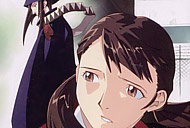
Boogiepop Phantom
Aside from the wonderfully understated Vampire Princess Miyu OVAs, there is little in the anime horror canon that is actually scary. There are plenty of titles that rely on gruesome creatures and enough blood to supply a small country's Red Cross unit. However, most of these don't actually wind up fulfilling their purpose because they simply aren't frightening. American filmmakers are guilty of the same sin--for every Jacob's Ladder or Sixth Sense, there are ten slasher sequels. However, Boogiepop Phantom manages to convey a sense of mystery and fear that is, at times, overwhelming. Though minor choices at the production level scar the show's potential and the gross out factor is still occasionally high, this is a triumph for the genre others should emulate.
Although the plot is labyrinthine, a basic outline should suffice. In a small prefecture outside of Tokyo, a serial killer was on the loose. His rampage left very few in the community untouched. That was five years ago--but once again, students are disappearing. Legend has it that the angel of death, Boogiepop, is coming to claim them. But is Boogiepop real, or just an urban legend?
As the show starts, a mysterious explosion of light covers the town, taking out the power briefly and wreaking havoc with computer systems. A strange aurora has covered the city ever since. With the aurora have come visions and powers. The students at the Shinjo Academy and Hirijidani High School are most affected. One sees bugs created by guilt and grief eating away at those around him. Some have flashbacks to the loss of friends and family to the unknown killer, flashbacks that start controlling their present lives. The rumors of Boogiepop run rampant. In the midst of it all, a young woman, Nagi Kirima, is determined to fight those who are behind the madness...a fight that might prove to be fatal.
Boogiepop Phantom is not a show for anyone who wants light entertainment. It easily ranks as the most highly confusing show I've seen in a great while. To give you an idea, each episode deals with a different person affected by the killer and the explosion of light. The show is really about them, and the continuing plot surrounding Boogiepop, Boogiepop's adversaries, and Nagi Kirima is more a side-story. The running plot is very much like the conspiracy story on The X-Files, whereas each individual episode is a stand-alone. To tell these stories, many of which happen almost simultaneously, we don't follow any linear narrative. Episodes weave in and out of the timeline, enough so that Pulp Fiction and Memento look straightforward by comparison.
If that wasn't enough to confuse the audience, the creators of the anime decided to make a frightening number of its characters look alike. This may have been intentional, to attempt to add to the dreamlike quality. However, this is my only beef with the show--the characters are so hard to separate from each other that it's difficult to make connections with previous episodes where those characters appeared. Seeing that the show was based on a series of novels and not a manga series, as many anime programs are, making all the characters appear too similar was a bad call that makes an already confusing time even worse.
Having said that, the confusion was part of the brilliance...and make no mistake, Boogiepop Phantom is brilliant. If you're willing to sit down afterwards and piece it all together, Boogiepop Phantom is a challenging but not-impossible puzzle. From that perspective alone, it's worthy of recognition.
I've never seen a show that was so genuinely creepy throughout. The atmosphere is set by the color scheme itself; except for the last episode, the show is in a virtual fog, tinted in browns and grays and blacks. It looks spooky from the start. Everything is planned to give you that sense of dread. There are also a lot of quick crossovers between episodes, which causes an immense amount of unsettling déjà vu for the viewer. As certain stories tie into each other, the effect magnifies itself. Some viewers have commented on how the opening theme, a retro-sounding song reminiscent of the 70s, seems out of place, but it actually has the one thing that the whole show is personified by: vibe. When all else fails, when things are too confusing and the story gets too convoluted, the vibe carries it through.
Many viewers have compared this show to Serial Experiments Lain, and it did share a similar late-night TV slot. However, Lain is an altogether different beast. Although both share a penchant for incomprehensibility and obscure color palettes, Boogiepop is more confident of itself, and a great majority of its plot twists can actually be deciphered without speculative interpretation. What's more, the show has a message in the form of a question, ultimately--are we condemned to live in the past, haunted by what's come before, or can we break free by resolving to live totally in the present? How you answer that question may change throughout the course of the 12 episodes. Though I cannot give it my highest recommendation, due to its intentional obfuscation of its plot through the methods I discussed before, it is certainly a worthy series for anyone who likes their anime with a strong bottle of head-trip.
Boogiepop Phantom -- graphic violence, mild profanity, disturbing concepts and imagery -- A-

